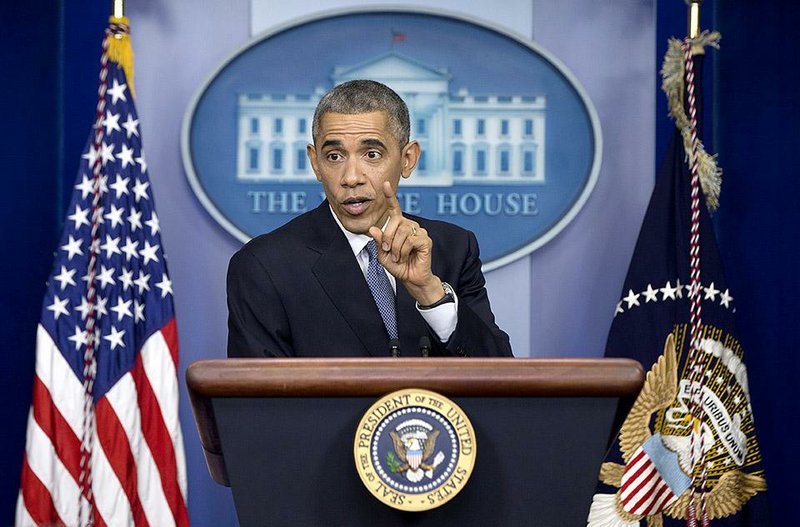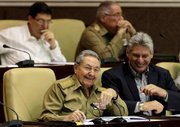WASHINGTON -- President Barack Obama on Friday rejected critics who said he should not have opened U.S. relations with Cuba because of that nation's human-rights record, saying the historic thaw would give the United States more sway with the Cuban government.
"I share the concerns of dissidents there and human-rights activists that this is still a regime that represses its people," Obama said at a wide-ranging news conference that followed a period of multiple domestic and foreign-policy changes at the White House.
As he acknowledged that Cuba might take actions the United States opposes, the president said "the whole point of normalizing relations is that it gives us a greater opportunity to have influence with that government."
Friday was the first time Obama took questions from reporters since his announcement Wednesday that he would restore diplomatic relations with Cuba, establish an embassy in Havana, and relax trade and financial restrictions that have been in place for nearly half a century.
Overall, the president used his annual late-December news conference to make the case that he has brought about an American economic resurgence, burnished U.S. leadership credentials around the world and given hope for a new phase of compromise with the Republican Congress.
"We've set the stage for this American moment, and I'm going to spend every minute of my last two years making sure that we seize it," he said.
The president faced questions about how his administration would manage the historic opening with Cuba, as well as an array of other foreign and domestic challenges.
The president was cautious in setting specific goals for how much progress he expected Cuba to make by the end of his tenure, but said "change is going to come to Cuba." Still, he said Congress was unlikely to quickly repeal a full U.S. economic embargo on Cuba.
"People are going to want to see how does this move forward before there's any serious debate about whether or not we would make major shifts in the embargo," Obama said.
A full lifting of the U.S. embargo on trade and travel would require action by Congress, where Cuban-American lawmakers have denounced Obama's action as a capitulation to the Castro regime.
Some Republicans, led by Florida Sen. Marco Rubio, a potential contender for his party's 2016 presidential nomination, said they will work to block Obama from normalizing relations with Cuba.
Obama said Friday that he had no plans to visit the island in the near term. But he recounted a friendly telephone call this week with President Raul Castro of Cuba. He said the two joked with each other about being long-winded and about the Cuban leader's brother, Fidel Castro.
After Obama apologized for speaking for so long during the call, he said, Castro told him: "You're still a young man, and you have still the chance to break Fidel's record: He once spoke for seven hours straight."
The president said the Cuban leader then delivered an opening statement at least twice as long as his. "I was able to say, 'Obviously, it runs in the family.'"
Despite Obama's upbeat mood as 2014 draws to a close, his sixth year in office has been one of fits and starts.
His agenda was frequently overshadowed by a broad array of crises, including the rise of Middle East militants, Russia's actions in in Ukraine, a surge of unaccompanied minors to the U.S.-Mexico border from the south and an Ebola outbreak in West Africa that sowed fear in this country.
Obama's Democratic Party suffered sweeping losses in a midterm election where the president was deemed too unpopular to participate.
But Friday's news conference ended a six-week period when Obama aggressively used his presidential powers to take sweeping unilateral action on immigration, re-establish diplomatic and commercial ties with Cuba, strike a climate agreement with China and press for strong rules on keeping the Internet free and open.
Obama suggested he had no intention of backing down on that approach.
"My presidency is entering the fourth quarter," he added. "Interesting stuff happens in the fourth quarter, and I'm looking forward to it."
Obama said he was eager to forge compromises with the incoming Republican Congress, including on revamping the nation's tax system, which he said should be changed to make it simpler and fairer.
The president said he would "make sure that we put forward some pretty specific proposals, building on what we've already put forward."
Among those proposals, he said he would push for changes to rules that allowed companies that are in the United States to move their headquarters "on paper" to another country in order to avoid taxes.
"I think that needs to be fixed," he said.
Obama and congressional Republicans agree that the corporate tax rate should be lower. They disagree on many other details of a potential tax overhaul, particularly when it comes to individual taxation and whether high-income people should pay more.
"The devil's in the details, and I'll be interested in seeing what they want to move forward," he said.
Obama also warned the GOP that he would block efforts to dismantle his health care law or further water down banking regulations. And he made no commitment to sign the first bill incoming Senate Majority Leader Mitch McConnell has vowed to take up: approval of the Keystone XL oil pipeline.
He downplayed the project's possible benefits, saying it would not lower gasoline prices and that more jobs would be created by repairing America's infrastructure.
But Obama said that overall he had been encouraged by recent conversations with some Republican leaders.
"I want to work with this new Congress to get things done," the president said. "We're going to disagree on some things, but there are going to be areas of agreement, and we've got to be able to make that happen, and that's going to involve compromise once in a while."
He said the lame-duck session of Congress that closed this week -- during which lawmakers passed large spending and defense bills -- showed that "perhaps that spirit of compromise may be coming to the fore."
After the news conference, Obama was to leave Washington for his annual family trip to Hawaii.
During his 17-day break, Obama is expected to spend some time crafting his State of the Union address, in which he will outline his goals for working with the GOP-led Congress. House Speaker John Boehner has invited Obama to address a joint session of Congress on Jan. 20.
Information for this article was contributed by Julie Hirschfeld Davis of The New York Times; by Richard Rubin, Angela Greiling Keane, Jonathan Allen, Mike Dorning and Carter Dougherty of Bloomberg News; and by Julie Pace, Nedra Pickler, Jim Kuhnhenn, Darlene Superville and staff members of The Associated Press.
A Section on 12/20/2014

